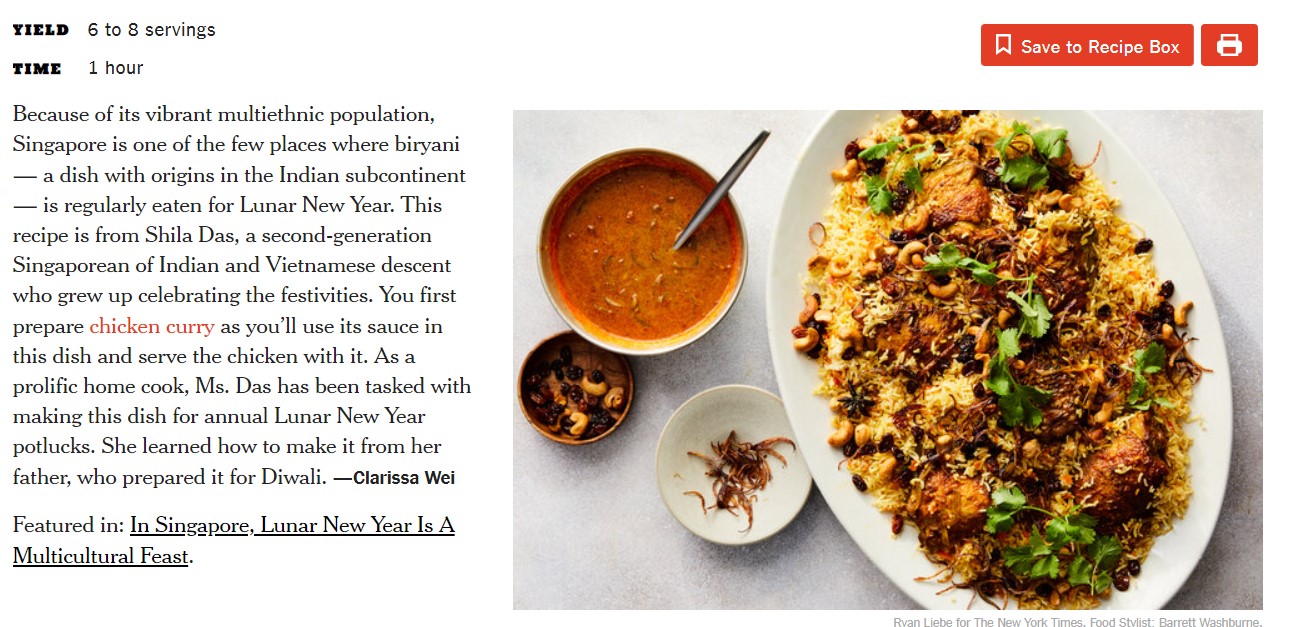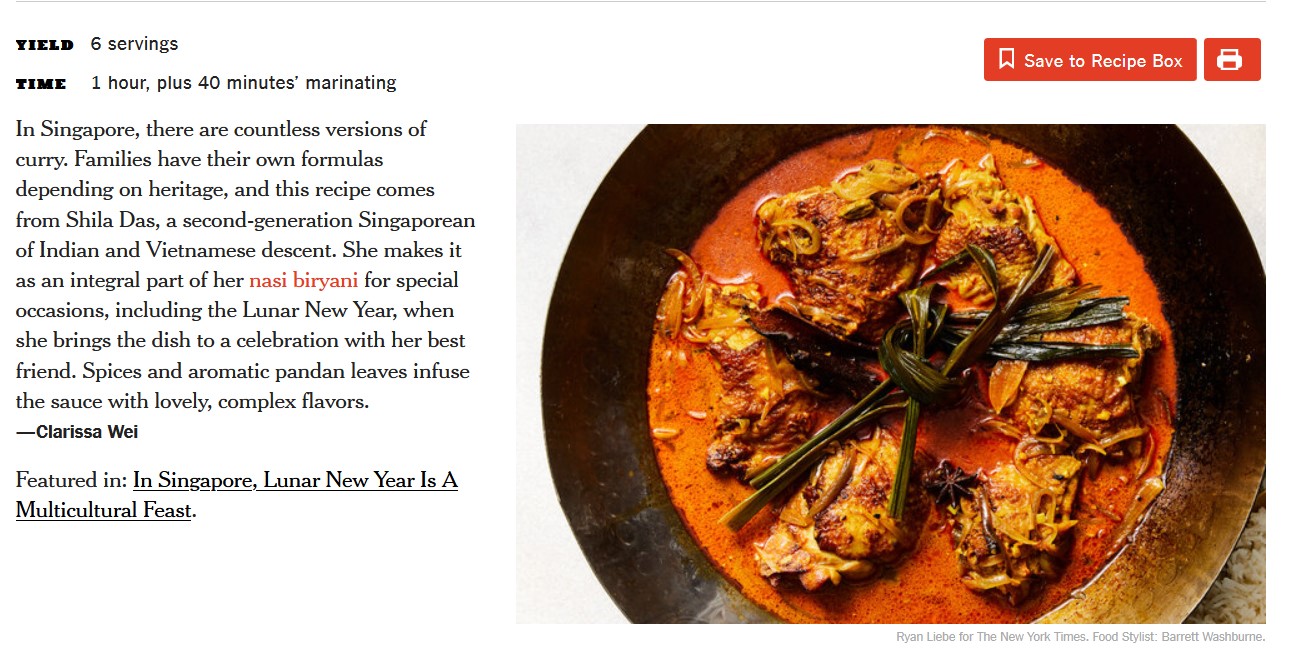There seems to be a Curry God out there listening to the prayers of Singaporeans, because the sewage-based “Singaporean Chicken Curry” that The New York Times produced has finally been removed after two weeks.
Okay, maybe it was the deluge of hate mail in four different languages (not discounting any dialects) that was really persuasive in telling the American paper that they seriously messed up the original recipe, or the thousands of creatively insulting comments that were left behind on the video.
In any case, at least it’s gone.
Not Faithfully Followed, No Apologies
In an Instagram posted on Friday (11 Feb), NYT Cooking wrote: “Last week we shared a video of a chicken recipe adapted from a home cook from Singapore. The video demonstration didn’t faithfully follow the recipe, which was adapted by Clarissa Wei from Shila Das, and it also should have been prepared as part of Ms. Das’s Nasi Biryani recipe. As a result, the video didn’t do justice to Ms. Das’s family dish or to her Lunar New Year tradition. After hearing your feedback, we’ve removed the video, and we have clarified the recipe. We’re appreciative of your response.”
View this post on Instagram
However, note that despite all the criticism and jeering that NYT Cooking received after Clarissa Wei’s terrible adaptation and execution that transformed Shila Das’ Chicken Briyani into the unpalatable Chicken Curry, there wasn’t even a single word of apology visible in the description.
Which, in all honesty, makes everything all the more insincere.
The Original Events
The Chicken Briyani recipe provided by Shila Das was supposed to be part of a feature about how multicultural Singapore celebrated Chinese New Year, showing off a dish from another ethnicity that can be seen on reunion tables.

The recipe itself was published on the NYT Cooking section on 21 Jan, but the Chicken Briyani had been separated into two parts instead— Nasi Briyani and Chicken Curry.
When Shila Das saw what had been done to her late father’s chicken briyani recipe, she predicted that trouble would inevitably brew.
After all, Singaporeans know their food, and people can tell a terrible recipe just from how the end product looks alone.
Sure enough, when the American paper uploaded a video of Clarissa Wei cooking the “Singaporean Chicken Curry” on Instagram, a torrent of abuse spewed out an ash-and-mud water look-alike chicken curry video.

In fact, if you want more information about how this abomination came into existence, you can watch an explanation video to the mystery here:
And frustratingly enough, the original recipe still remains in two parts even now. The only thing that has been changed are the descriptions.
On the Nasi Briyani page, it states that “you must first prepare chicken curry as you’ll use its sauce in this dish and serve the chicken with it.”
Then on the Chicken Curry page, it writes, “She makes [the chicken curry] an integral part of her nasi briyani for special occasions”.


And they still have the gall to continue crediting the pages as “Recipe from Shila Das, Adapted by Clarissa Wei”.
If you change it to “Ruined by” Clarissa Wei, I’d grant you my forgiveness, willingly.
Look, the whole contention and anger behind the bastardising of the recipe stemmed from the fact that it was treated as two parts instead of a whole.
What was it for, for more page views?
Did it make sense as you were preparing them as separate parts instead of a whole?
I mean, you just needed to take one look at your end product to know that you’ve got it all wrong; how did it manage to get the green light from the video editor and the social media manager to go on Instagram?
Spices and emotions have tastes and flavours to them, but I’m not getting any from The New York Times on this, because they have simply never cared.
Join our Telegram channel for more entertaining and informative articles at https://t.me/goodyfeedsg or download the Goody Feed app here: https://goodyfeed.com/app/
One Last Problem
Despite The Straits Times and Shila Das’ numerous inquiries as to why the original recipe was broken into two, they have never received an answer to that question.
Ms Das has also informed The Straits Times that the paper has finally contacted her and she will be discussing the problem with them.
The first thing on her list of priorities is to request that they stick to her original recipe rather than have it split into two parts.
The 51-year-old home cook mentioned that she was glad that the video had been taken down as well.
Ms Das said: “It is long overdue. I asked for it to be taken down when it was posted. I don’t understand why it wasn’t done earlier. And I feel the damage has already been done. It just seems they are doing the polite thing. The right thing would have been to take it down two weeks ago.”
Honestly, Ms Das, you’re still giving them the benefit of the doubt here when they don’t deserve it.
The Question of Recipes
Moreover, Ms Das divulged that if she was planning on cooking chicken curry, it would have been vastly different.
It would have curry leaves, cumin, fennel seeds, more chilli powder, turmeric, and potatoes.
It wouldn’t have been necessary to marinate the chicken with lime juice, nor would she have used pandan leaves. She would have opted for coconut milk instead.
To stir more sewage in the pot, the comment section of NYT cooking is a thing of nightmares, where people have stated that they substitute pandan leaves with vanilla pods because they couldn’t find the former ingredient in their home state.
“If you put in a few drops of vanilla extract, it might not be so apparent. But vanilla pods are so sweet and rich,” Ms Das commented. “They are not something I would put in a savoury dish.”
Having been scarred by this experience, Ms Das swears she will never offer up another recipe again.
Touché.
Read Also:
- Migrant Worker Dies from Infection After Being Prescribed Wrong Medications by His Doctor
- No Signboard’s Korean Food Brand Mom’s Touch Suddenly Announced That They’ve Ceased Operations in All Outlets
- FDW Got Beaten by Employer for Saying That He Ate a Lot
- Don Don Donki Having Snack Truck So You Can Buy Their Snacks Without Hearing Their Song
Featured Image: Instagram




